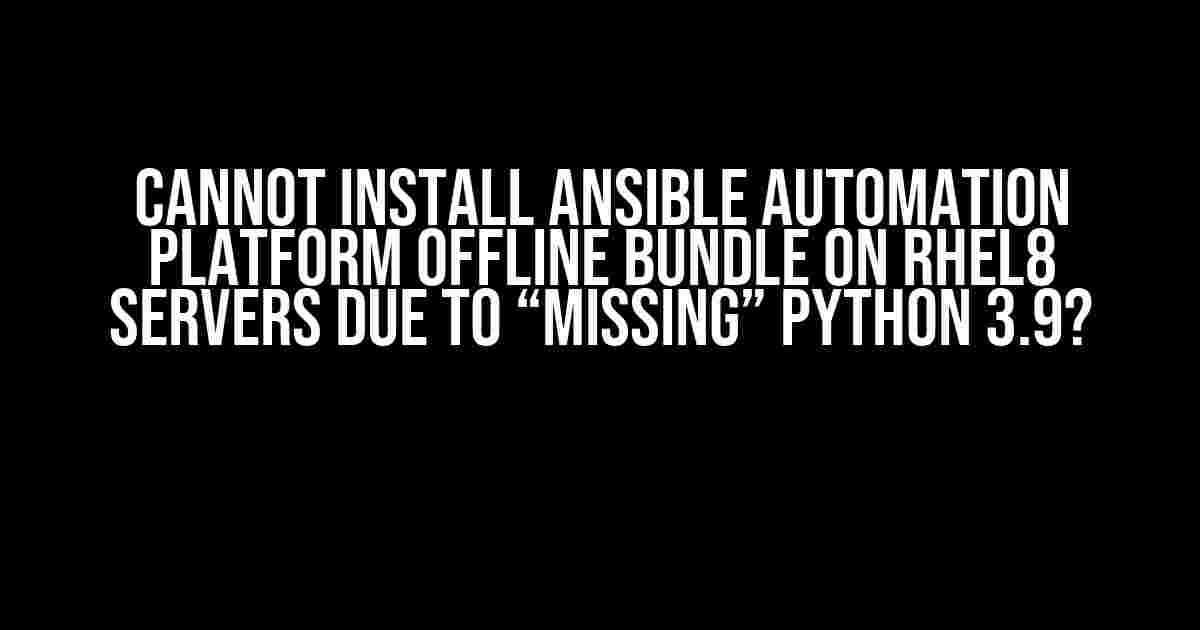Are you stuck trying to install the Ansible Automation Platform offline bundle on your RHEL8 servers, only to be met with an error message complaining about a “missing” Python 3.9? Fear not, dear automation enthusiast! This article is here to guide you through the solution, step by step.
What’s the issue?
The Ansible Automation Platform offline bundle is a fantastic way to get started with automation, but it does come with some dependencies. One of those dependencies is Python 3.9, which is not included in the default RHEL8 repositories. This is where the problem arises.
Why Python 3.9, you ask?
Ansible Automation Platform requires Python 3.9 as a minimum version, and RHEL8 only provides Python 3.6 by default. The offline bundle is built against Python 3.9, so it’s essential to have it installed on your system.
Solution time!
Don’t worry; we’ll get you up and running in no time. Here’s a step-by-step guide to installing Python 3.9 and the Ansible Automation Platform offline bundle on your RHEL8 servers:
Step 1: Enable the EPEL repository
The EPEL (Extra Packages for Enterprise Linux) repository provides additional packages not included in the standard RHEL repositories. We’ll need it to install Python 3.9.
sudo dnf install https://dl.fedoraproject.org/pub/epel/epel-release-latest-8.noarch.rpm
Step 2: Install Python 3.9
Now that we have EPEL enabled, let’s install Python 3.9:
sudo dnf install python39
Step 3: Verify Python 3.9 installation
Make sure Python 3.9 is installed correctly:
python3.9 --version
You should see the following output:
Python 3.9.5
Step 4: Download the Ansible Automation Platform offline bundle
Head over to the Ansible Automation Platform download page and grab the offline bundle for your architecture (x86_64 or aarch64). For this example, we’ll use the x86_64 bundle:
wget https://releases.ansible.com/ansible-automation-platform/v2.2.0/ansible-automation-platform-2.2.0-offline-bundle-x86_64.tar.gz
Step 5: Extract the offline bundle
Extract the offline bundle to a directory of your choice (e.g., `/opt/ansible`):
sudo tar -xvf ansible-automation-platform-2.2.0-offline-bundle-x86_64.tar.gz -C /opt/ansible
Step 6: Install the Ansible Automation Platform
Change into the extracted directory and install the Ansible Automation Platform:
sudo /opt/ansible/install.sh
Follow the installation prompts to complete the setup.
Troubleshooting tips
If you encounter any issues during the installation process, here are some common troubleshooting tips:
-
python3.9command not found:Make sure you’ve installed Python 3.9 correctly and updated your system’s PATH environment variable.
-
Ansible Automation Platform installation fails:
Verify that you’ve extracted the offline bundle correctly and that you have enough disk space available.
-
Python 3.9 conflicts with system Python:
Be cautious when installing Python 3.9, as it might conflict with the system Python version. Make sure to use the correct Python version when running the Ansible Automation Platform installation script.
Conclusion
And that’s it! You should now have the Ansible Automation Platform offline bundle installed on your RHEL8 servers, complete with Python 3.9. Remember to keep your system up to date and maintain the EPEL repository for future package updates.
| Step | Command |
|---|---|
| Enable EPEL repository | sudo dnf install https://dl.fedoraproject.org/pub/epel/epel-release-latest-8.noarch.rpm |
| Install Python 3.9 | sudo dnf install python39 |
| Verify Python 3.9 installation | python3.9 --version |
| Download Ansible Automation Platform offline bundle | wget https://releases.ansible.com/ansible-automation-platform/v2.2.0/ansible-automation-platform-2.2.0-offline-bundle-x86_64.tar.gz |
| Extract offline bundle | sudo tar -xvf ansible-automation-platform-2.2.0-offline-bundle-x86_64.tar.gz -C /opt/ansible |
| Install Ansible Automation Platform | sudo /opt/ansible/install.sh |
Happy automating!
FAQs
-
Q: Can I use a different version of Python?
A: Ansible Automation Platform requires Python 3.9 as a minimum version. Using an earlier version might lead to compatibility issues.
-
Q: What if I’m using a different Linux distribution?
A: The steps provided are specific to RHEL8, but you can adapt them to other Linux distributions by using the corresponding package managers and repositories.
-
Q: How do I update the Ansible Automation Platform?
A: Refer to the Ansible Automation Platform documentation for update instructions, which may vary depending on your installation method.
That’s all for now! If you have any further questions or need more assistance, feel free to ask in the comments below.
Final thoughts
Installing the Ansible Automation Platform offline bundle on RHEL8 servers can be a bit tricky, but with these steps, you should be up and running in no time. Remember to keep your system and dependencies up to date, and don’t hesitate to reach out if you encounter any issues.
Happy automating, and until next time, stay curious and keep on learning!
Frequently Asked Question
Stuck on installing Ansible Automation Platform offline bundle on RHEL8 servers? We’ve got you covered! Check out these FAQs to resolve the “missing” Python 3.9 issue.
Why does the installation of Ansible Automation Platform offline bundle fail on RHEL8 servers?
The installation fails because RHEL8 does not include Python 3.9 in its default repositories. Ansible Automation Platform requires Python 3.9, which is not included in the default installation of RHEL8. This leads to the “missing” Python 3.9 error.
How do I enable the AppStream repository on RHEL8 to install Python 3.9?
To enable the AppStream repository, run the command `sudo subscription-manager repos –enable rhel-8-for-x86_64-appstream-rpms` (for x86_64 architecture). This will allow you to access the necessary packages, including Python 3.9.
What is the correct order of commands to install Python 3.9 and Ansible Automation Platform offline bundle on RHEL8?
First, enable the AppStream repository using `sudo subscription-manager repos –enable rhel-8-for-x86_64-appstream-rpms`. Then, install Python 3.9 using `sudo dnf install python39`. Finally, install the Ansible Automation Platform offline bundle using `sudo ./ansible-automation-platform-setup.bundle`.
Will I need to configure anything else after installing Ansible Automation Platform offline bundle?
Yes, after installing the offline bundle, you’ll need to configure the Ansible Automation Platform by running `sudo ansible-automation-platform-setup` and following the prompts to complete the setup process.
Are there any additional resources available to help with the installation and configuration of Ansible Automation Platform?
Yes, you can find detailed documentation and guides on the official Ansible website, as well as community resources and forums where you can ask for help and share your experiences with other users.
